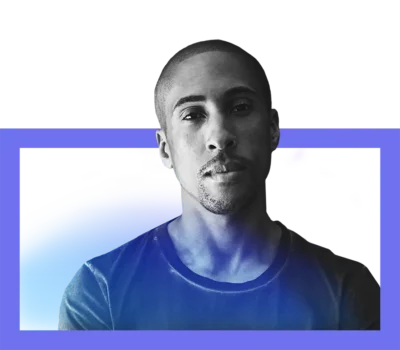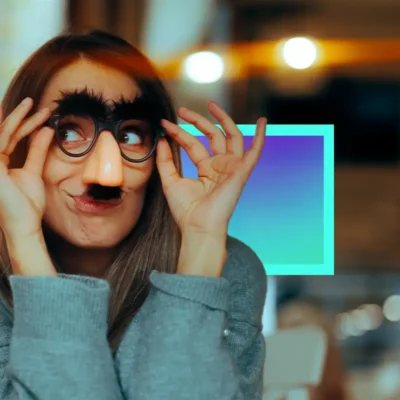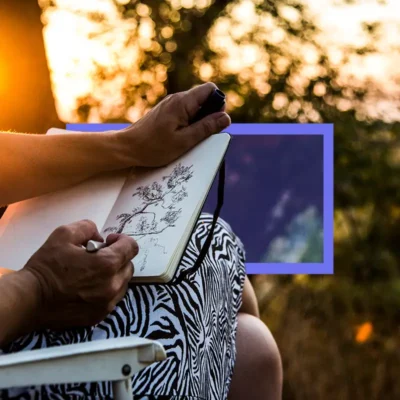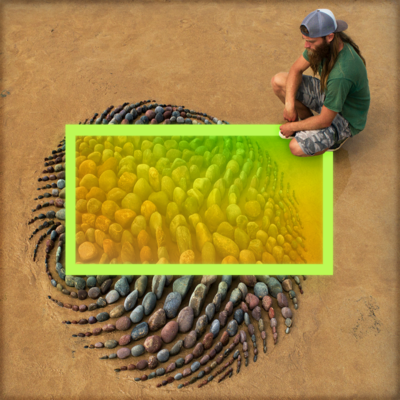To visualize … and then make it so
In a tiny studio in Tampa, Florida, with new-to-the-scene Jennifer Hudson and a Pomeranian dog named Grammy, young music producer Larry Jackson begins to feel the heat. It’s his job to not only make music, but to make hits. And it’s not happening. From an early age, Larry has had to scramble to make things happen for himself – and chance luck has made him a bit superstitious. The creative process can be terribly disheartening when the elusive spark never comes. Sometimes the power of believing – of willing something into reality – is all we have. And that’s where Larry’s journey begins.
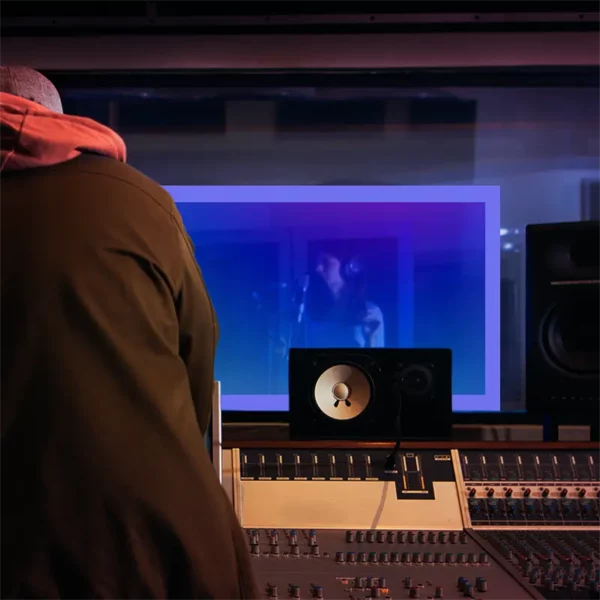
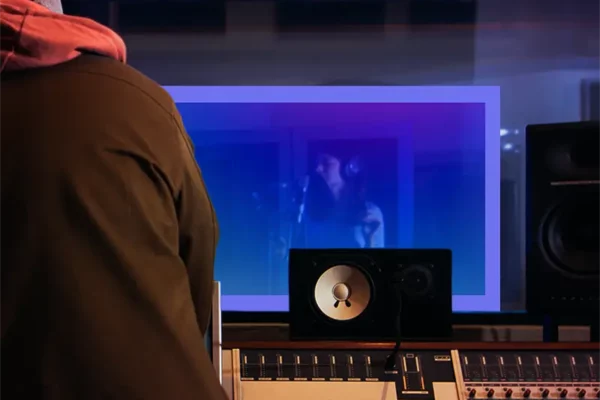
Table of Contents:
Transcript:
To visualize … and then make it so
LARRY JACKSON: It’s funny, because my job as a music producer, an A&R executive, is to go out and find the best material – songs, songwriters, producers – and the best up-and-coming artists, and bring them together, and then will them into success.
The job is entirely predicated upon finding things that aren’t yet in their fully realized form and bringing them into existence. I’m literally in the business of manifesting, I suppose. Discovering and unearthing – and again, manifesting.
ROHAN GUNATILLAKE: Behind every great artist there are all sorts of people whose own dedication and creativity enable the stars to be the stars. Larry Jackson is one of those people. From his start in the music industry at the age of 11 to his current role as Global Creative Director at Apple Music, there aren’t many people who know more about how great music is made than Larry.
In this series, we blend immersive, first-person stories with mindfulness prompts to help you restore yourself at any time of the day. I’m Rohan, and I’ll be your guide on this episode of Meditative Story. From time to time, we’ll pause the story ever so briefly for me to come in with guidance to enhance your experience as you listen. I hope these prompts will be helpful to you.
And let’s take a moment now to settle in before we hear from Larry. Letting whatever thoughts and feelings are around be around, letting them be here.
The body relaxed. The body breathing. Your senses open. Your mind open. Meeting the world.
JACKSON: I’m sitting in a cramped, hole-in-the-wall recording studio in Tampa. I await the arrival of a vocal powerhouse. She’s coming in to record a new song for her upcoming album. I’ve spent a large part of my professional life in state-of-the-art recording studios in Los Angeles, New York, London, Johannesburg, Paris. But our location today is pretty nondescript from the outside – and frankly isn’t much better when you get inside its control room.
I’ve arrived early. An hour and a half later, in walks Jennifer Hudson – and she’s not alone. Two young Pomeranians are with her. I’d met one of them before. Its name is Oscar. But the other one, who I don’t recognize at all, is new. Jennifer introduces me to her second dog, which she’s named… Grammy.
The pun and deliberacy have gone completely over my head. I ask her with a clueless naiveté why she’s chosen those two particular names, Oscar and Grammy. Very matter of factly, she says: “Well, I won an Oscar already, and now we’re about to win a Grammy, ain’t we?!”
I feel my brow begin to sweat. My body stiffens. And I laugh uncontrollably at what’s being implied. The studio starts to feel even smaller and shabbier than it is.
You see, I’m her producer. I signed Jennifer Hudson earlier that year. I’m 27. The stakes are high; and the pressure is palpable. Jennifer’s recording contract had been signed not long after she captured the country’s heart as a standout contestant on “American Idol”, and right before she won the Oscar for Best Supporting Actress in the blockbuster movie, “Dreamgirls”.
In my career, I’ve had the great fortune to work with so many incredible artists, ranging from Whitney Houston to Chicago rapper Chief Keef to the national treasure Aretha Franklin, and so many more. I’ve forged trusting relationships with the best songwriters in the business as well. So when I started working with Jennifer, I think, okay, no problem.
She’s got a remarkably unique vocal prowess and power, so the potential for a hit album is easy to visualize for me. Between her insane talent, the momentum around “Dreamgirls”, and my relationships with the creative community, it feels like this should crystallize quickly.
But between that initial optimism and this moment in Tampa, it’s almost been a year and a half of toil and sporadic fruitfulness. Jennifer and I have travelled to London to record with Timbaland. We’ve spent time in Los Angeles, Atlanta, and a few other cities trying to decode this creative Rubik’s cube. Yet we still don’t have a first single to unlock her debut album’s potential.
Though I’ll never admit it, it feels like this is a languishing process with no foreseeable end in sight. It feels like we have decent stuff but in many ways we’re nowhere… well actually in this tiny studio, in Tampa, with me, Jennifer, and a yappy Pomeranian who she had the bold confidence to name Grammy.
We don’t leave that Florida recording session with our first single. But instead, I have a feeling of a heightened sense of pressure to finish this album – and not leave Oscar as the only one of those dogs who’s lived up to its name.
In the meantime, though, a story had just come out in the press that her debut album had been scrapped by Clive Davis over creative differences in terms of its direction. While the story was a bit of an exaggeration, the struggle that I was experiencing was a very real and arduous challenge. I was feeling the heat and feeling quite daunted.
While in London two weeks later, I’m at The Dorchester Hotel struggling deeply with jet lag at 4 am and decide to catch up on some overdue demo listening. At the top of the stack is the proposed demo for Jennifer’s song, titled “Spotlight” written by Ne Yo.
I generally pride myself on being a one-listen creative executive. I feel if a song has hit potential after hearing the first verse and the first chorus. After countless days and nights of endlessly listening for needles in haystacks, I’ve honed this intuitive skill to a soulful science. And immediately when I hear this one, I know we have it. The track has the same bark as Aretha’s classic “Respect” and the same bite as her anthemic “Think”. He nailed it. I listen to the demo non-stop until the sun comes up. I can’t believe it. This is finally our first single.
GUNATILLAKE: Can you picture the scene? Can you feel the energy and excitement that Larry’s feeling in this moment? Feel the sensation of finally finding what you’ve been looking for.
JACKSON: And just like that, I somehow got all the colors to line up on our creative Rubik’s cube. I see it clearly. It unlocks everything. It unlocks the power of the album. Unlocks my waning confidence. Unlocks the future path of the project.
Fast forward to September of that year: The song becomes a number one R&B single in the U.S. February rolls around and it’s the 2009 Grammy Awards – no less than a year after my first amusing encounter with Grammy, the moody, mercurial Pomeranian. We arrive late but right on time. Within moments of taking our seats, Whitney Houston comes out to present the Grammy award for the year’s Best R&B Album. It’s been a great year in this genre and the competition is stiff and tough, to say the least.
I’m 28 years old. It’s the first time I’ve ever been on the floor at the Grammys, where all of the decorated nominees are also seated. As it relates to Best Album categories, if you serve as album producer for the project, you win an award alongside the artist. So as album co-producers, Clive Davis and I stand to take one home respectively that night as well. I’m excited yet nervous.
Whitney opens up the envelope and announces the winner, it’s JENNIFER! I can’t believe it. As I stand to applaud Jennifer as she takes the stage to accept the award, all I can seemingly think about at that moment is Grammy the Pomeranian. She was right!
It’s a celebratory night. The next morning it all hits me what an important moment it is for me personally.
GUNATILLAKE: Can you recall an event in your life where you received some good news about a hard-won accomplishment? Can you remember what the space you were in at that time was like? Go there.
JACKSON: My childhood helps me understand why the creative journey with Jennifer is one of my life’s turning points. At 10 years old, I was really obsessed with pop culture and our local radio station in San Francisco, 106 KMEL. I used my family’s black touch-tone phone in the kitchen to call radio contests all the time. It didn’t have any fancy features – no redial, no frills, nothing like that.
And I was always punching in the numbers as fast as I could with my nimble little fingers as I attempted to be caller 10, caller 106, or whatever number was required to win. I’d push the buttons as fast as I could, and if I heard a busy signal, I’d hang up and start punching those numbers over and over again. I became so fast though and so proficient, so good at winning these contests that they finally said, “Kid, you can’t win anymore but we’d love to have you down to the station sometime soon for a tour and a hang.”
That moment afforded me a unique opportunity to put my foot in the door. And slowly but surely I became a fixture there. At age 11, my dad bought me my first two turntables and a microphone from Radio Shack. I amusingly created my first DJ booth in my bedroom. Practice, practice, practice.
The next two years I was an apprentice at the radio station and practicing at home in my off-time. At 14, I’m a full-time intern now and a board op at KMEL, which by the way, is market number four in the entire country. By 16, I’m hired as the music director of the station, which has fallen to eighth place in the market. By age 17, I’m expelled from high school because I’m spread too thin across academics and work. At age 19, we triumphantly take the station back to its number one ratings position in the market – and then I get a call.
The call is from legendary music impresario Clive Davis. If I had to explain it, on the Mount Rushmore of the music business, Clive Davis has got to be something like George Washington. A legendary New York-based record producer and executive who signed countless artists ranging from Whitney Houston to Aerosmith to Alicia Keys to Bruce Springsteen and Notorious B.I.G.
Clive says, “I hear you’ve got some of the best ears in radio! How about coming to New York for an interview. I’m starting a new record label. I think you’d be a great fit.” That phone call single handedly changes my life.
From an early age, I’ve always made a lot of things happen for myself. But before I met Jennifer Hudson and, of course, Grammy the Pomeranian, I’d always been overly superstitious. I often thought that if I didn’t think something would happen, that it probably would happen. But I had it dead wrong. Jennifer showed me that the best way to make things happen is to believe that they will so much that you’re willing to name your tiny little dog after them to see them through.
It’s funny, because my job as a music producer, an A&R executive, is to go out and find the best material – songs, songwriters, producers – and the best up-and-coming artists, and bring them together, and then will them into success.
The job is entirely predicated upon finding things that aren’t yet in their fully realized form and bringing them into existence. I’m literally in the business of manifesting, I suppose. Discovering and unearthing – and again, manifesting.
The creative geniuses I work with show me the power of believing. They visualize and then they make it so. Even though I never went to college, I somehow beat the statistics for African-American men who don’t, and willed a life of pursuing my passion based on knowing that I’m supposed to be here. That I belong.
All someone had to do was pass me the ball – or rather all I had to do was get on the court and fight tenaciously for it. Manifestation wasn’t how I would have described it in my teens, but it’s clearly what it is. Seeing it blossom powerfully through the lens of another helped me understand how to better harness that power. All my life, I had been trying to visualize the future with my eyes closed. I only used my ears.
Speak what you seek until you see what you say. That’s the creed, that’s the mantra, that’s the belief.
Rohan’s closing meditation
GUNATILLAKE: We’ve reached the end of Larry’s story.
While the idea of visualizing future events in order to support their coming about is not so much a part of the mindfulness tradition, there is a related idea: manifesting qualities.
No matter how you approach meditation, a good way of understanding what it’s all about is that it’s about growing qualities: qualities of mind and qualities of heart. Concentration, kindness, self-awareness, balance in times of difficulty and challenge – they’re all qualities we can manifest in ourselves. And the best way to do that is not to imagine them in our future but to actually realize them in our present.
So if you dream of being an amazing, kind, compassionate person but that feels far away, the way to get there is by being kind now, in whatever way you can. If being calm under pressure or not being pushed around by your own negative thinking is the future you want to manifest, then see what you can do to be like that now.
Steadiness, joy, sensitivity, presence with others – these are natural qualities we all have. And if we want to build them up, all we need to do is practice them, to work on those muscles, to reinforce those neural pathways. It’s not magic. It’s training. And we can do some now if you like.
Letting your body be however it is.
Encouraging relaxation. Relaxing any tension in your face, your hands, your belly.
Letting your mind be however it is.
Encouraging letting go. Watching any thoughts and ideas come up and drift away. No real need to get tangled up in them or give them any solidity.
Breathing.
Breathing.
And let’s start with calm.
We may tell ourselves the story that we’re not calm at all, that our minds are all over the place, flitting from one thing to another. Let go of any stories like that for now and let’s manifest calm.
The calmest, most balanced person in the world is only ever just calm in the moment. So let’s be that person and be calm in this moment.
Letting your awareness drop into the sensations where your body contacts the ground. Simple, steady. The breath, long and steady.
Watching any thoughts that come up on the screen of the mind. Watching them, knowing them, but not getting caught up in them.
Manifesting calm. Manifesting calm by being calm.
Now let’s try sensitivity.
The quality of moving through life with subtlety and depth.
The most sensitive person is sensitive now.
So let’s be that person.
Starting by switching through our senses, noticing what’s most obvious through each of our sense doors.
Noticing the physical sense, what is most prominent.
Noticing sight, any objects which come to your attention.
Noticing hearing, sounds that arise and sounds that fall away.
Noticing tastes and smell if there’s anything here, or if it’s quite neutral.
Noticing thinking, watching thoughts and leaving them alone.
Another aspect of sensitivity is subtlety. So as before, asking yourself the question: What is the furthest sound you can hear right now?
Letting your mind be open. And subtle. And sensitive.
We all have these qualities within us. We just have to manifest them. To make them real. But ultimately you just have to be that person, moment by moment. Starting now.
